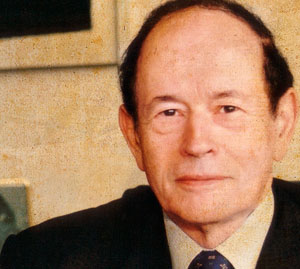After Ursinus

Gerald Edelman ’50
1972 Nobel Prize Winner in Medicine
Class of 1950, Edelman shared the 1972 Nobel Prize for a breakthrough in immunology and went on to a distinguished career in neuroscience.
Dr. Edelman was Founding Director of The Neurosciences Institute in La Jolla, Calif. He was professor at The Scripps Research Institute and chairman of the Department of Neurobiology at that institution.
Dr. Edelman was the subject of an exclusive interview in the Fall 2011 Ursinus Magazine. He said in that interview that when he went to Ursinus the College was known for the fields of religion and medicine. Now, he said, “it has been transformed into a truly deep liberal arts organization.”
He visited the campus Feb. 17, 2000, to dedicate a refurbished Pfahler Hall, where he was once a student. Dr. Edelman recalled that he left Ursinus after a year and a half, but returned to graduate. He credited his sister, a member of Class of 1947, with encouraging him to return. He also said he remembered “without too many traces of nostalgia but with some gratitude,” two professors, Foster Dennis, a professor of mathematics, and Charles Mattern, a professor of philosophy.
After receiving his B.S. degree magna cum laude, he received an M.D. degree from the University of Pennsylvania. He became a Captain in the U.S. Army Medical Corps and practiced general medicine at a hospital connected with the American Hospital in Paris. In 1957, he joined the Rockefeller Institute as a graduate fellow and after receiving his Ph.D. he remained at the Rockefeller Institute, eventually becoming a professor. He and a research team at Rockefeller determined the structure of an entire immunoglobulin molecule, which was the basis for the 1972 Nobel Prize in Physiology or Medicine, shared with Rodney R. Porter, a British scientist, who worked independent of Dr. Edelman. His work on antibodies changed previously held concepts of the immune response.
From the mid-1970s on, Dr. Edelman studied the brain and the nature of consciousness. He had helped establish that antibodies work according to a process like Darwinian selection, and he put forth a theory of the brain which came to be known as “neural Darwinism.” This work led to the discovery of cell adhesion molecules (CAMs), which have been found to guide the fundamental processes by which an animal achieves its shape and form and by which nervous systems are built. To understand higher brain functions, Edelman and his colleagues constructed a series of mobile devices with simulated brains. These brain-based devices (BBDs) were shown to be capable of learning, operant conditioning, and episodic memory.
Dr. Edelman also formulated a detailed theory to explain the development and organization of higher brain functions. This theory was presented in his volume, Neural Darwinism (Basic Books, New York, 1987). More recently, he described a theory of consciousness in his book, Wider Than The Sky: The Phenomenal Gift of Consciousness (Yale University Press, New Haven, 2004). His last book, Second Nature: Brain Science and Human Knowledge (Yale University Press), was published in October 2006.